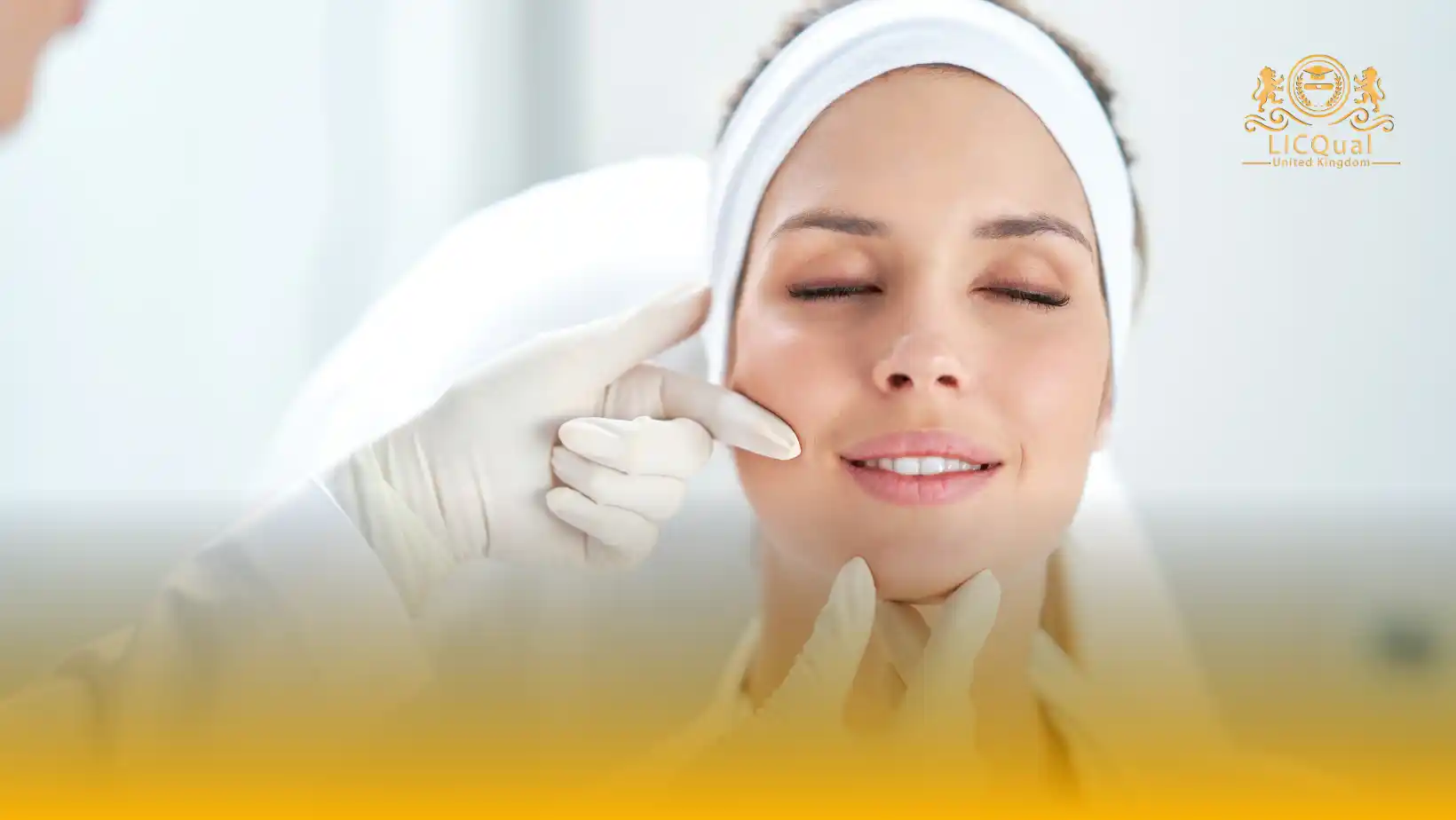The LICQual Level 7 Postgraduate Diploma in Aesthetic Dermatology is a highly specialised qualification designed for professionals seeking to advance their expertise in the field of aesthetic medicine and dermatological practice. This programme is not intended for beginners but is tailored for experienced practitioners who wish to expand their professional knowledge, refine their clinical skills, and strengthen their career prospects within a competitive and evolving industry. By focusing on advanced dermatological techniques, evidence-based practice, and the latest innovations in aesthetics, the course equips learners with the confidence and competence to deliver safe, effective, and ethical treatments.
A key feature of this qualification is its emphasis on Continuing Professional Development (CPD), enabling learners to enhance their portfolio, maintain high standards of practice, and align with professional regulatory expectations. It provides an in-depth understanding of skin health, advanced procedures, patient care, and clinical decision-making, supporting learners to progress into senior roles or diversify their professional practice in aesthetic dermatology.
Centres offering this diploma must demonstrate a commitment to excellence by ensuring that all training is delivered by competent, experienced, and qualified staff. They must also provide the appropriate facilities, clinical resources, and materials necessary to foster a high-quality learning environment. This ensures that learners receive rigorous, practice-focused education, underpinned by the highest standards of training.
Ultimately, the Level 7 Postgraduate Diploma in Aesthetic Dermatology empowers learners to achieve professional growth, gain recognition in their field, and contribute to raising standards of practice across the aesthetic and dermatological sectors.
Course Overview
Qualification Title
LICQual Level 7 Postgraduate Diploma in Aesthetic Dermatology
Total Units
6
Total Credits
120
GLH
600
Qualification #
LICQ2200997
Qualification Specification
To enroll in the LICQual Level 7 Postgraduate Diploma in Aesthetic Dermatology, applicants must meet the following criteria:
|
Qualification# |
Unit Title |
Credits |
GLH |
|---|---|---|---|
|
LICQ2200997-1 |
Advanced Principles of Dermatology and Skin Science |
20 |
100 |
|
LICQ2200997-2 |
Clinical Assessment and Diagnostic Techniques in Aesthetic Dermatology |
20 |
100 |
|
LICQ2200997-3 |
Aesthetic Dermatological Procedures and Interventions |
20 |
100 |
|
LICQ2200997-4 |
Pharmacology, Therapeutics, and Safe Prescribing in Aesthetic Medicine |
20 |
100 |
|
LICQ2200997-5 |
Clinical Governance, Ethics, and Professional Practice in Aesthetic Dermatology |
20 |
100 |
|
LICQ2200997-6 |
Research Methods and Evidence-Based Practice in Aesthetic Dermatology |
20 |
100 |
By the end of this course, learners will be able to:
Unit 1: Advanced Principles of Dermatology and Skin Science
- Demonstrate critical understanding of skin anatomy, physiology, and ageing processes.
- Analyse complex dermatological conditions and their relevance to aesthetics.
- Evaluate the cellular and molecular mechanisms of skin health and disease.
- Apply advanced dermatological knowledge to clinical aesthetic practice.
Unit 2: Clinical Assessment and Diagnostic Techniques in Aesthetic Dermatology
- Conduct comprehensive patient consultations and medical history assessments.
- Apply advanced diagnostic tools and techniques for aesthetic dermatology.
- Evaluate patient suitability for various aesthetic interventions.
- Develop personalised treatment plans based on clinical evidence and patient needs.
Unit 3: Aesthetic Dermatological Procedures and Interventions
- Demonstrate practical competence in advanced non-surgical and minimally invasive procedures.
- Critically evaluate the safety, efficacy, and outcomes of different aesthetic interventions.
- Apply appropriate infection control and patient safety protocols.
- Integrate innovative technologies and methods in aesthetic dermatological practice.
Unit 4: Pharmacology, Therapeutics, and Safe Prescribing in Aesthetic Medicine
- Analyse pharmacological principles relevant to aesthetic dermatology.
- Demonstrate safe prescribing practices aligned with professional standards.
- Critically assess therapeutic products used in aesthetic medicine.
- Apply evidence-based decision-making in pharmacological treatments.
Unit 5: Clinical Governance, Ethics, and Professional Practice in Aesthetic Dermatology
- Evaluate the principles of clinical governance and their application in aesthetic dermatology.
- Demonstrate ethical decision-making in complex clinical scenarios.
- Apply relevant legal and regulatory frameworks to practice.
- Promote professional accountability and uphold patient-centred care.
Unit 6: Research Methods and Evidence-Based Practice in Aesthetic Dermatology
- Design and implement research projects relevant to aesthetic dermatology.
- Critically appraise academic literature and clinical evidence.
- Apply statistical and qualitative methods to research analysis.
- Integrate research findings into professional practice to advance clinical outcomes.
The LICQual Level 7 Postgraduate Diploma in Aesthetic Dermatology is designed for medical professionals, dermatologists, cosmetic physicians, and healthcare practitioners who want to advance their skills in aesthetic and cosmetic dermatology. This Level 7 qualification is ideal for those seeking internationally recognized credentials, practical expertise in aesthetic procedures, and the ability to enhance patient outcomes. Whether you work in hospitals, private clinics, or aesthetic practices, this diploma equips you with the knowledge and confidence to excel in advanced cosmetic dermatology.
Doctors and Dermatologists
- Designed for physicians and dermatologists aiming to specialize in aesthetic dermatology.
- Enhances knowledge of skin anatomy, cosmetic treatments, and anti-aging procedures.
- Builds skills in botulinum toxin, dermal fillers, and laser therapies.
- Improves ability to create personalized treatment plans for patients.
- Supports career progression with an internationally recognized qualification.
Cosmetic Physicians and Surgeons
- Ideal for medical professionals performing non-surgical aesthetic procedures.
- Strengthens expertise in minimally invasive treatments and skin rejuvenation.
- Encourages safe and evidence-based clinical practice.
- Promotes advanced understanding of cosmetic dermatology techniques.
- Builds credibility and recognition in private and international aesthetic clinics.
Nurses and Allied Health Practitioners
- Suitable for nurses and practitioners working in aesthetic and dermatology clinics.
- Enhances patient care and treatment planning skills.
- Builds confidence in supporting cosmetic procedures and post-treatment care.
- Develops knowledge of ethical and professional standards in aesthetic medicine.
- Supports professional development and CPD accreditation.
Medical Students and Postgraduate Trainees
- Suitable for graduates pursuing specialization in aesthetic medicine or dermatology.
- Provides a strong foundation in cosmetic procedures and skin therapies.
- Enhances clinical reasoning, research, and practical skills.
- Prepares learners for postgraduate training or career advancement.
- Offers internationally recognized certification to boost professional credentials.
Healthcare Managers and Clinic Owners
- Designed for managers overseeing aesthetic clinics or dermatology services.
- Improves knowledge of patient care standards and treatment protocols.
- Strengthens operational and administrative skills in aesthetic practices.
- Supports implementation of safe and effective clinical procedures.
- Enhances leadership in managing aesthetic healthcare teams.
International Healthcare Professionals
- Perfect for global learners seeking UK-recognized aesthetic dermatology training.
- Offers flexible online learning to balance work and study.
- Equips learners with skills for international cosmetic medicine practice.
- Builds credibility in global dermatology and aesthetic medicine markets.
- Supports career growth and global professional recognition.
Private Clinic Practitioners
- Tailored for doctors and specialists running private aesthetic clinics.
- Enhances patient consultation and treatment planning expertise.
- Builds advanced skills in cosmetic dermatology procedures.
- Promotes safe and effective non-surgical treatments.
- Supports business growth and professional reputation in aesthetic medicine.
Centres delivering the LICQual Level 7 Postgraduate Diploma in Aesthetic Dermatology must meet the following requirements to ensure the highest quality of education, training, and learner success:
- Qualified and Experienced Staff: Tutors, trainers, and assessors must be suitably qualified, experienced, and competent in aesthetic dermatology and clinical education.
- Adequate Learning Resources: Centres must provide access to up-to-date learning materials, textbooks, clinical guidelines, and digital resources to support advanced study.
- Clinical Facilities and Equipment: Appropriate clinical settings, equipment, and tools must be available to ensure learners can develop practical skills in line with industry standards.
- Robust Quality Assurance Processes: Centres must implement effective internal quality assurance systems to maintain the integrity and consistency of assessments and training delivery.
- Learner Support Services: Centres should offer academic guidance, mentoring, and career support to promote learner achievement and professional development.
- Commitment to CPD and Industry Standards: Centres must remain aligned with current professional regulations, ethical practices, and Continuing Professional Development requirements in aesthetic dermatology.
- Safe and Ethical Learning Environment: Training must be delivered in a safe, inclusive, and ethical setting that prioritises patient safety, learner welfare, and professional accountability.
Assessment and Verification
All units within this qualification are subject to internal assessment by the approved centre and external verification by LICQual. The qualification follows a criterion-referenced assessment approach, ensuring that learners meet all specified learning outcomes.
To achieve a ‘Pass’ in any unit, learners must provide valid, sufficient, and authentic evidence demonstrating their attainment of all learning outcomes and compliance with the prescribed assessment criteria. The Assessor is responsible for evaluating the evidence and determining whether the learner has successfully met the required standards.
Assessors must maintain a clear and comprehensive audit trail, documenting the basis for their assessment decisions to ensure transparency, consistency, and compliance with quality assurance requirements.







